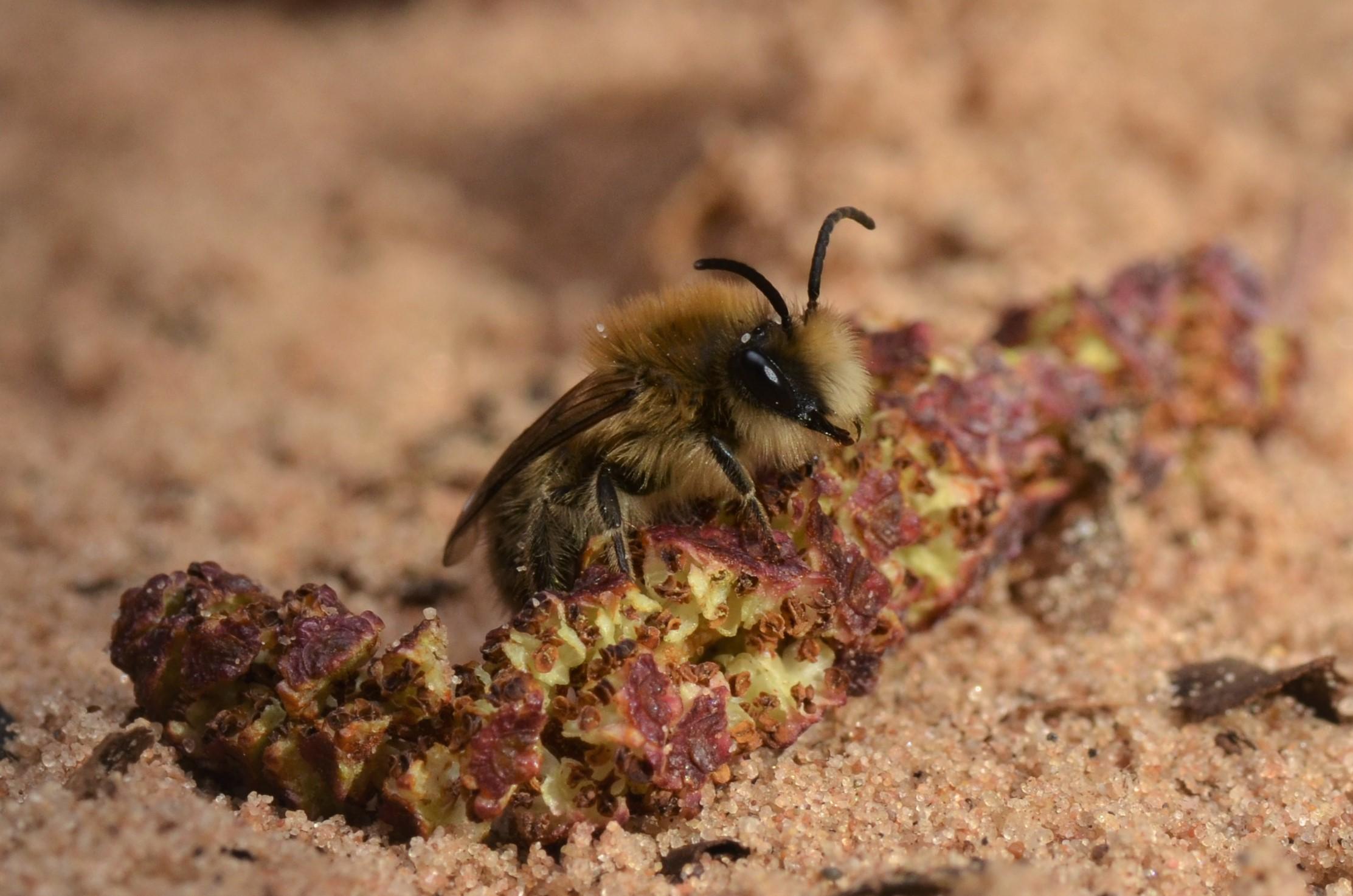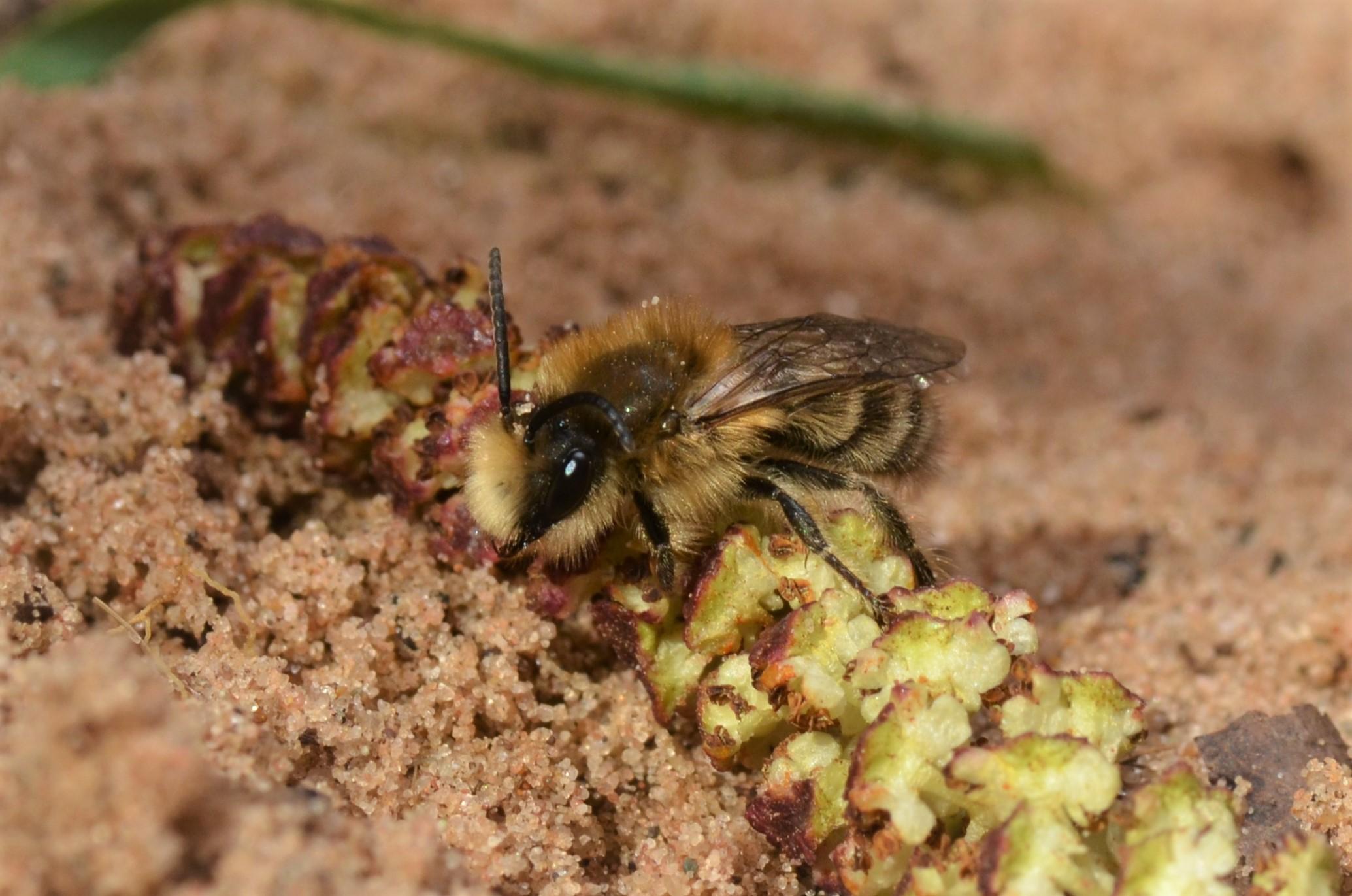Rare species of bee recorded in Warwickshire for first time

A rare species of bee, Colletes cunincularius, has been discovered at Ryton Pools Country Park, marking the first time that the bee has been recorded in Warwickshire.
Colletes cunicularius, also known as the Spring Plasterer Bee, is a solitary, early-spring bee species that typically nests in very sandy soil, feeding predominantly on sallow blossoms. It has a distinctive fluffy face, and its nesting behaviour involves digging tunnels in the ground, which they line with a cellophane-like material. Like many bee species, the Spring Plasterer Bee is known to be an important pollinator of a range of plants, including fruit trees and wildflowers.

A Spring Plasterer Bee (Colletes cunincularius)
The already relatively small population of this species declined heavily during the twentieth century, to the point that it was known to exist at just a few sites on the northwest coasts of England and Wales. Since 2010, populations have steadily recovered and begun expanding southwards and inland to new areas.
The list of bee species at Ryton Pools now stands at an impressive 82, thought to be one of the best single site lists in Warwickshire. The diverse range of bee species indicate that the park's ecosystem is healthy and able to support a rich tapestry of wildlife.
The discovery of Colletes cunicularius was made during a survey conducted by Warwickshire Country Parks Ranger George Humphrey, who carries out regular monitoring of insect populations in the area. He identified a single male in early March, and the ranger team has since confirmed a healthy population of the bees in the same area.
The ranger team continually work hard to develop a welcoming environment for bees at Ryton Pools. Building bee hotels (specifically designed to benefit a wide range of bee species), planting wildflower-rich pond edges, and seeding new wildflower meadows, are just some of the projects that have helped promote a bee-friendly ecosystem at the park.
2021 was the first full year of bumblebee transects (or 'BeeWalks') at Ryton Pools Country Park. In a transect, a recorder walks along the same fixed path regularly, counting bees along the way and making a note of their species. The route is walked at least monthly from March to October and covers key areas of the site to ensure that there are sections of hedgerow and meadow in flower all year round, and also that there is high flower diversity during the peak season. The bumblebee transects are part of a national scheme run by the Bumblebee Conservation Trust.
Bees and other pollinators pollinate nearly three quarters of the plants that produce 90% of the world’s food. Over the past 50 years, the number of crops dependent on pollinators, such as fruit, vegetables and seeds, has tripled.
Bees also play a key role in preserving the balance of biodiversity in nature. By pollinating, bees protect and maintain ecosystems as well as animal and plant species.
George Humphrey, the Warwickshire Country Park Ranger who made the discovery, said: “The discovery of Colletes cunicularius at Ryton Pools was a wonderful and unexpected start to the 2023 bee recording season. The park is one of the few places in Warwickshire with suitable conditions for this bee, which highlights the importance of preserving the unique habitats in all of Warwickshire’s country parks and green spaces. I am proud to be part of a team working to ensure our park’s ecosystems continue to support a range of species, including the Spring Plasterer Bee.”
Mark Ryder, Strategic Director for Communities at Warwickshire County Council, said: “We are thrilled to have recorded a new species of bee at Ryton Pools Country Park. It’s a testament to the rich biodiversity of the area and the importance of protecting and conserving our natural habitats. We will continue to work closely with our partners to ensure that Warwickshire remains a vibrant and diverse ecosystem for generations to come.”

For more information about Warwickshire’s Country Parks, visit: www.countryparks.warwickshire.gov.uk
